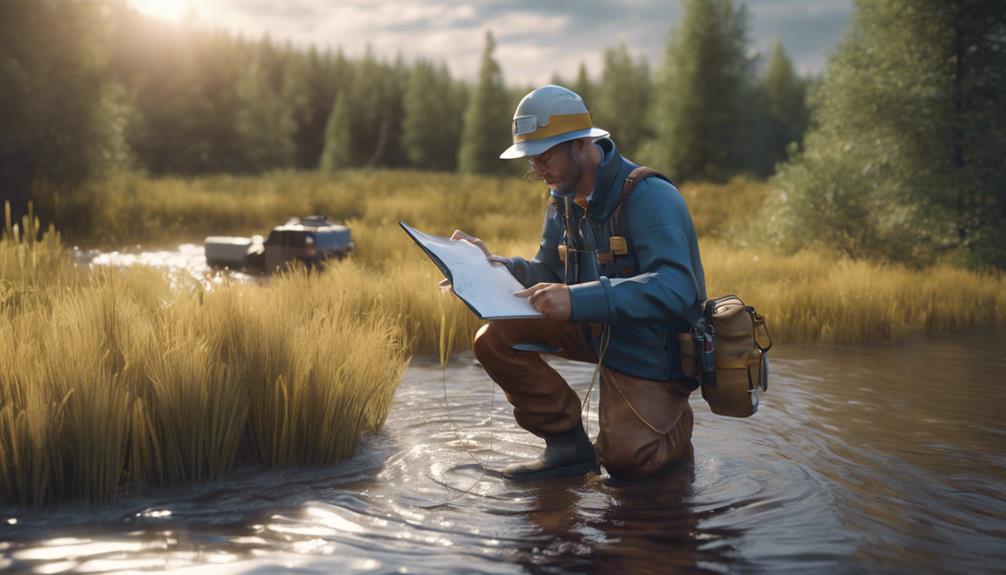Hydrologist Job Description
Hydrologists investigate water distribution, circulation, and quality to manage resources effectively. They collect field data, predict floods, and assess human impacts on water systems. Responsibilities include developing sustainable resource strategies, analyzing hydrological data, and monitoring water quality. Proficiency in statistical analysis, field research, and environmental science are essential skills. Work environments vary from fieldwork to data analysis, collaborating with diverse professionals. Career advancement opportunities include specialization in areas like groundwater hydrology and project management. Median annual salary for hydrologists was $82,260 in 2020. Understanding a hydrologist's job is vital for environmental and water resource management.
Key Takeaways
- Conduct field research to collect data on water sources and quality.
- Analyze hydrological data using statistical techniques for insights.
- Develop sustainable water management strategies based on findings.
- Assess impact of climate change on water resources.
- Collaborate with professionals to address water management challenges.
Role of a Hydrologist
Hydrologists play an important role in studying the distribution, circulation, and quality of water on Earth. Through field research, hydrologists collect data on various water sources such as rivers, lakes, and groundwater. This data is essential for understanding water cycles, predicting floods, managing water resources, and ensuring water quality for human consumption and ecosystem health.
Field research involves conducting surveys, taking measurements, and collecting samples to analyze in laboratories. Hydrologists use sophisticated equipment to measure water flow, quality, and sediment levels. Data analysis is a key aspect of a hydrologist's role, where they interpret complex data sets to draw conclusions and make recommendations. This analysis helps in creating models to simulate water systems and predict future scenarios based on different variables.
Hydrologists also play a crucial role in evaluating the impact of human activities on water resources, such as pollution and climate change. By combining field research and data analysis, hydrologists provide valuable insights that inform policymakers, land managers, and the public on how to sustainably manage water resources for current and future generations.
Key Responsibilities
In the domain of hydrology, the fundamental duties involve a thorough analysis of water distribution and quality within diverse ecosystems. Hydrologists play a vital role in managing water resources and understanding the impact of climate change on water systems.
Key responsibilities in this field include:
- Water Resource Management: Hydrologists are tasked with developing sustainable water resource management strategies to guarantee the efficient use and conservation of water in various environments.
- Data Analysis: Analyzing complex hydrological data is a core responsibility. Hydrologists use advanced statistical and modeling techniques to interpret data related to precipitation, evaporation, and water flow.
- Field Research: Conducting field surveys and investigations is essential for collecting data on water sources, quality, and movement. Fieldwork allows hydrologists to gather firsthand information to support their analyses.
- Climate Change Impact Assessment: Hydrologists assess the effects of climate change on water resources. They study how changing weather patterns and temperatures influence water availability, quality, and distribution, informing mitigation and adaptation strategies.
Required Skills and Qualifications
Proficiency in quantitative analysis and statistical modeling techniques is essential for individuals seeking a career in hydrology. Hydrologists must possess strong analytical skills to interpret complex data related to water resources effectively. Additionally, expertise in field research is critical as hydrologists often conduct on-site investigations to collect data on water quality, quantity, and movement. Proficient knowledge of data analysis tools and software is necessary to process and analyze large datasets accurately.
Furthermore, hydrologists should have a solid understanding of environmental science principles and hydrological processes. Strong communication skills are also crucial as hydrologists frequently collaborate with interdisciplinary teams, present findings to stakeholders, and prepare detailed reports. A bachelor's degree in hydrology, geoscience, environmental science, or a related field is typically required for entry-level positions, while advanced roles may necessitate a master's or doctoral degree. Continuous learning and staying updated on advancements in hydrological research methodologies are essential for success in this field.
Work Environment
The work environment for hydrologists typically involves a combination of fieldwork, data analysis, and collaboration with interdisciplinary teams to study and manage water resources effectively. Hydrologists can be found working in various settings, including government agencies, consulting firms, research institutions, or environmental organizations.
- Field Research: Hydrologists often spend time conducting fieldwork, which may include collecting water samples, measuring water flow rates, installing monitoring equipment, and evaluating environmental conditions in rivers, lakes, or watersheds.
- Data Analysis: Analyzing data is an important part of a hydrologist's job. This involves processing large datasets, using statistical tools and models to interpret trends, and generating reports or maps to communicate findings effectively.
- Interdisciplinary Collaboration: Hydrologists frequently collaborate with professionals from diverse backgrounds such as geologists, engineers, biologists, and policymakers to address complex water management challenges.
- Varied Work Settings: Hydrologists may work both indoors and outdoors, splitting their time between office-based tasks like report writing, data analysis, and fieldwork in different weather conditions and terrains.
Career Outlook and Advancement
Career progression for hydrologists involves opportunities for specialization and advancement within the field, allowing professionals to deepen their expertise and take on more challenging roles. Hydrologists can choose to specialize in areas such as groundwater hydrology, surface water hydrology, or eco-hydrology, which can lead to increased job satisfaction as they focus on specific interests within the field. Advancement in the hydrology field often includes roles with more responsibilities, such as project management, leading research teams, or consulting for government agencies or private firms.
In terms of salary potential, hydrologists generally have favorable earning prospects. According to the U.S. Bureau of Labor Statistics, the median annual wage for hydrologists was $82,260 in May 2020, with the top 10% earning more than $124,540. As hydrologists gain experience and expertise in specialized areas, they may command higher salaries. Additionally, pursuing advanced degrees or certifications can further enhance salary potential and career opportunities in hydrology.
Conclusion
In summary, the role of a hydrologist is essential in understanding and managing water resources. With key responsibilities including data analysis, modeling, and fieldwork, hydrologists require strong analytical skills and a background in environmental science or engineering.
The work environment can vary from government agencies to consulting firms, offering diverse opportunities for career growth. Overall, the demand for hydrologists is expected to increase, making it a promising field for those passionate about water management and conservation.







